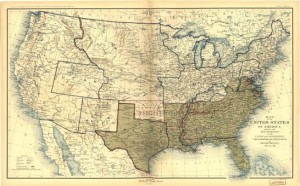 Today the U.S. War Department gives black abolitionist Frederick Douglass, a friend of Northern Baptists, permission to travel to Vicksburg and recruit “colored troops” in the Union-controlled Southern city. Douglass has already been a successful recruiter for other African American regiments, including the notable 54th Massachusetts Regiment, where two of his own sons serve.
Today the U.S. War Department gives black abolitionist Frederick Douglass, a friend of Northern Baptists, permission to travel to Vicksburg and recruit “colored troops” in the Union-controlled Southern city. Douglass has already been a successful recruiter for other African American regiments, including the notable 54th Massachusetts Regiment, where two of his own sons serve.
C. W. Foster of the U. S. War Department writes Douglass this day:
Sir, I am instructed by the Secretary of War to direct you to proceed to Vicksburg, Mississippi, and on your arrival there to report in person to Brig’r General L. Thomas, Adjutant General, U. S. Army, to assist in recruiting colored troops.
Meanwhile, a Southern Baptist newspaper reports on the prospect of unlawful baptisms in Confederate Army camps.
A chaplain in the S.C. Regiment enquiries of the Confederate Baptist, if he ought to baptize a candidate who aims his determination to join a Pedo-baptist church. The Baptist very properly says not; that as baptism is the appointed and indispensable antecedent to church membership, if the applicant frankly avows that he has no such end in view, there is no reason why their ministers should give him a certificate to pass through the lines.
These two bits of news are reflective of larger trends henceforth. While the United States is increasingly successful in recruiting new soldiers, particularly African Americans, revivals are a growing focal point of Confederate Army life. Conversely, new recruits are harder to come by in the South, while Union army revivals, albeit noteworthy, are probably not publicly considered to be as pivotal to battlefield successes as those of the South.
Sources: Letter, C. W. Foster, U.S. War Department, to Frederick Douglass, August 13, 1863 (link); “Unlawful Baptism,” Biblical Recorder, August 12, 1863 (link)


